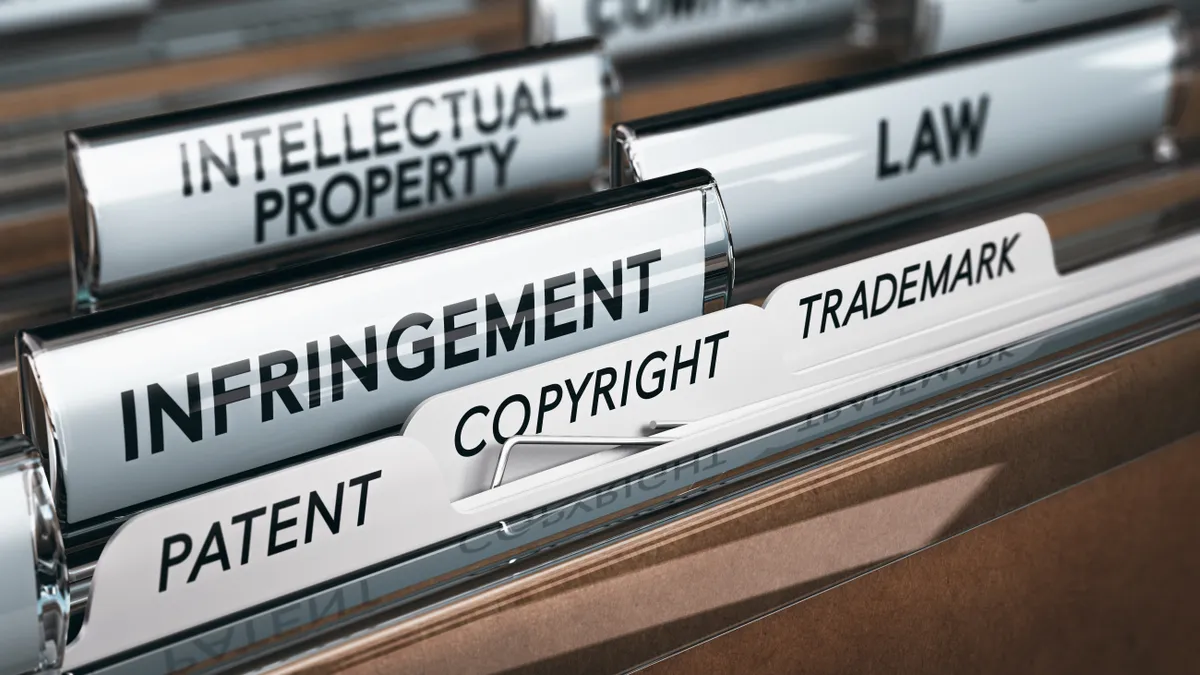Dive Brief:
- Delaware Chief Judge Colm Connolly has escalated his battle over the use of secrecy by third-party litigation funders by taking aim at the lawyers in a string of patent infringement cases.
- Saying the lawyers might have breached their fiduciary duties, the federal district court judge in a Nov. 27 memo referred them to their respective state bar associations for possible disciplinary action. In separate actions, he referred the cases the lawyers were involved in to the Department of Justice and Patent and Trademark Office for their review of possible violations of law. He also referred some of the lawyers to the Texas Supreme Court for the possible unauthorized practice of law.
- The lawyers, Connolly said in the memo, helped IP Edge, a litigation funder that’s big in the patent space, shield its identity and pass its litigation liability risk onto a handful of shell companies owned by “relatively unsophisticated individuals” whose interests the lawyers were obligated to represent but didn’t. “Their loyalty was not to their clients, but rather to IP Edge,” the judge said.
Dive Insight:
Connolly made a stir almost two years ago when he issued a standing order requiring every party coming before his court to disclose any third-party litigation funders in their cases. Critics have since challenged the order.
Groups representing big businesses like the Chamber of Commerce supported this and other transparency requirements, saying it helps ensure lawsuits are filed on their merits and not as a means to extract awards. Supporters also argued transparency can help shed light on the financial involvement of foreign countries.
“The usage of third-party litigation funding as a form of investment has seeped into all facets of the American civil litigation system,” the Chamber of Commerce said in a report.
Critics say disclosure is little more than an effort to help businesses use an expensive, drawn-out discovery process to discourage smaller companies from filing meritorious lawsuits against them, and they dismiss the foreign-involvement argument as a red herring.
“The latest accusations by industry opponents that foreign adversaries are using legal finance to manipulate the legal system to the detriment of national security of the United States are baseless and incorrect,” Gary Barnett, executive director and general counsel of the International Litigation Finance Association, said in an email.
Shell companies
In his memo, Connolly said the lawyers didn’t comply with his order to disclose the role of IP Edge in dozens of patent infringement lawsuits they brought against Buzzfeed, Bloomberg, CNET and a number of other companies for infringement on behalf of the patent holders. The patents involved computer and cell phone technology.
Based on his investigations into the cases, Connolly said, he determined that the three companies behind the lawsuits were in fact shell companies created to hide the identity of the real patent holder, IP Edge, and to put a firewall in front of the company should the cases go to trial and the defendants win, putting the loser on the hook for sanctions and attorney fees.
“The reality in these cases is that the de facto owner of the asserted patents – that is, the party that truly controls and profits from their assertion – is IP Edge,” Connolly said.
A number of the cases brought by the shell companies – called Nimitz Technologies, Mellaconic and Lamplight Licensing – have since been withdrawn.
According to Connolly, IP Edge used an affiliate called Mavexar to recruit people to own the shell companies in exchange for a percentage of the money the company made by suing, or threatening to sue, companies for patent infringement. In at least two of the shell companies, the owner’s share would be 5%, while the rest would go to IP Edge in what Connolly called a “lopsided” arrangement.
“The terms … in these cases deprived the [shell company owner] of the benefit of independent counsel,” he said.
Ethics referrals
In referring the attorneys to their state bar associations for possible disciplinary action, Connolly said they represented themselves as working for the shell company owners but they initiated and, in some cases, settled and moved to dismiss, infringement lawsuits on the owners’ behalf without ever consulting them and even without having met them.
“Their failure to fulfill their fiduciary duties is especially concerning because of the obvious disparity in the sophistication of the [shell company] plaintiffs as opposed to Mavexar and IP Edge,” Connolly said.
George Pazuniak of O’Kelly & O’Rourke, one of the lawyers identified in the memo, didn’t immediately respond to a request for comment, but he defended his actions in an email statement to Bloomberg Law.
“Plaintiffs’ counsel followed the law, and had not done anything wrong or unethical or unprofessional,” he said.
Other attorneys named in Connolly’s memo didn’t immediately respond to a request for comment.











